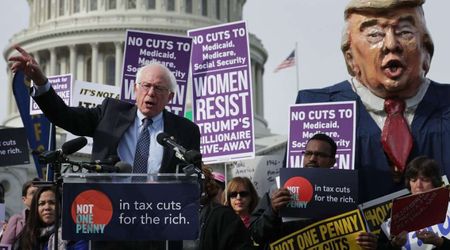Don’t panic if an airline leaves you stranded — you might be entitled to financial compensation

What action is the Department of Transportation taking to compensate stranded travelers?

Per FOX Business, "this rule would, for the first time in U.S. history, propose to require airlines to compensate passengers and cover expenses such as meals, hotels, and rebooking in cases where the airline has caused a cancellation or significant delay," Transportation Secretary Pete Buttigieg said in a statement breaking down the specifics of the new notion, "when an airline causes a flight cancellation or delay, passengers should not foot the bill." However, the rule does have guidelines.
The proposed rule would come into effect "when there is a controllable airline cancelation or significant delay." Suggested forms of compensation for controllable airline cancellations or significant delays could be a meal or meal voucher, overnight accommodations, ground transportation to and from a hotel, or flight rebooking. The rate at which customer service agents address passenger concerns over controllable airline cancellations will also be re-evaluated by airline companies.
This measure of action amends rulings over flight delays and cancellations previously issued by the Department of Transportation. Amendments to their stance on whether passengers would be eligible for financial compensation over flight delays have been made in hindsight of the airline pandemonium that has caused greater upset within the industry. It was reported that federal law didn't require airlines to compensate passengers.
What form of compensation can stranded travelers expect?

In defense of their new ruling, the Department of Transportation has launched FlightRights.gov to keep American travelers up to date about what they may be entitled to. So far, these incentives have been broken into three major categories: cash compensation, travel credit or voucher, and frequent flier miles. The incentives can be redeemed when a cancellation or delay results in a passenger waiting three hours or more from the scheduled departure time.
Forbes reports that similar guidelines have already been in practice by Canadian and European airlines. The Department of Transportation hasn't defined what a controllable airline cancellation or significant delay means when asking airlines to offer some sort of payout to affected patrons. Before this rule, no major U.S. airline offered cash compensation following a three-hour delay. Travelers should know that these new mitigations may take months to go into effect.
The Department of Transportation has worked to obtain reasonable compensation for travelers.

For those saddled with unnecessary costs added onto their already-hefty travel fees, the Department of Transportation is holding airline companies responsible for repayment. This is a reassuring step toward ensuring the U.S. is prepared if the industry faces extreme turmoil again. Airline companies have the means of generating an income and compensating passengers doesn't pose any threat of loss against their earnings.
Providing compensation to ensure customer satisfaction won't even dent airline companies' earnings. The compensation might help ease travelers' pre-flight anxiety now that a "safety net" has been implemented.
This article originally appeared on 8.5.23.






















